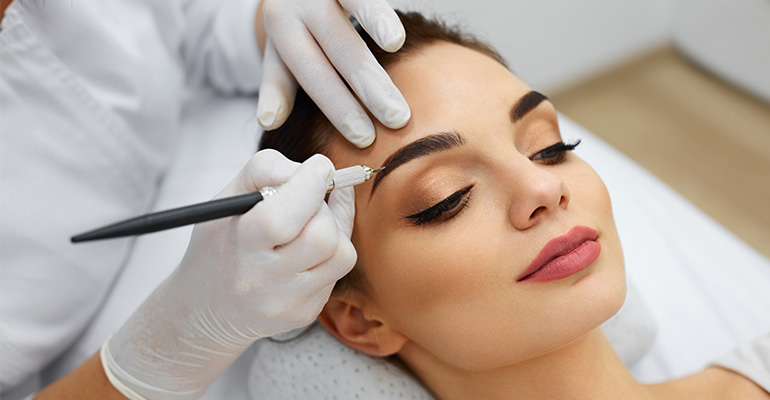In today's fast-paced world, it seems like people will do anything to save time. Drive-throughs are now found at your local pharmacy, and there's no need to write checks when there's automatic bill pay -- people like things fast and easy. It's no wonder then that many people choose to speed up their morning regimen by getting permanent makeup. The idea of permanent makeup may sound strange, but it's just one of many ways people choose to make routine tasks quicker.
Permanent makeup is essentially a tattoo that makes you appear as if you're always wearing makeup. In fact, the procedure is much like that of getting a tattoo -- the technician applies the pigment with a needle, and eventually you may have to return for touch-up visits. During the consultation, you can select the shades of your permanent makeup, and the technician will sketch the areas on your skin to be pigmented. Permanent makeup technicians use a hollow needle that releases color into a hole in your skin. Although pigment is applied to the top layer of skin only, the procedure may still sting -- just like it does when you get a tattoo. It takes about three weeks for the pigment to fade to the color you selected.
Permanent makeup is also called micropigmentation or permanent cosmetics. The art of permanent makeup has become a specialized service within both the tattoo community and the cosmetic industry, and the field is growing as more technicians become available to treat a growing number of clients [source: Society of Permanent Cosmetic Professionals].
If you're thinking about getting permanent makeup applied, take some time to consider the benefits and the possible complications. While permanent makeup may save you time and energy each morning, there are some medical problems associated with it. Furthermore, you may not always want to wear black eyeliner -- and tattoo removal can be difficult. Read on to learn more about this growing practice, its benefits and its drawbacks.
Benefits of Permanent Makeup
The most obvious benefit of permanent makeup is that it can simply save you time. People with busy schedules, long commutes and numerous commitments can several minutes out of their morning routine each day. And you never have to worry about your makeup smudging or fading -- permanent makeup won't come off after swimming, working out or showering. But there are many reasons for someone to get permanent makeup beyond the timesaving benefits.
People with physical disabilities or impaired motor skills, such as arthritis, Parkinson's disease or multiple sclerosis, may want permanent makeup because it's difficult for them to apply makeup themselves [source: Society of Permanent Cosmetic Professionals]. With permanent makeup, they can continue to wear makeup without having to worry about whether they've applied it accurately. People with poor eyesight may invest in permanent makeup for the same reasons.
There are also cosmetic reasons why people use permanent makeup. After reconstructive surgery, especially of the face or breasts, permanent makeup can help return the skin's appearance to normal if pigment was lost during surgery. In fact, some people choose to undergo permanent makeup procedures to improve the results of cosmetics breast surgery [source: Hess Plastic Surgery]. People with hair loss conditions that cause them to lose their eyebrows may invest in permanent eyebrow tattoos, whereas people with lip scars can use permanent lipstick to hide the unsightly marks. Permanent makeup can also benefit people with cosmetic allergies or those with pigmentation conditions like vitiligo, which causes the appearance of irregular white patches on the skin.

